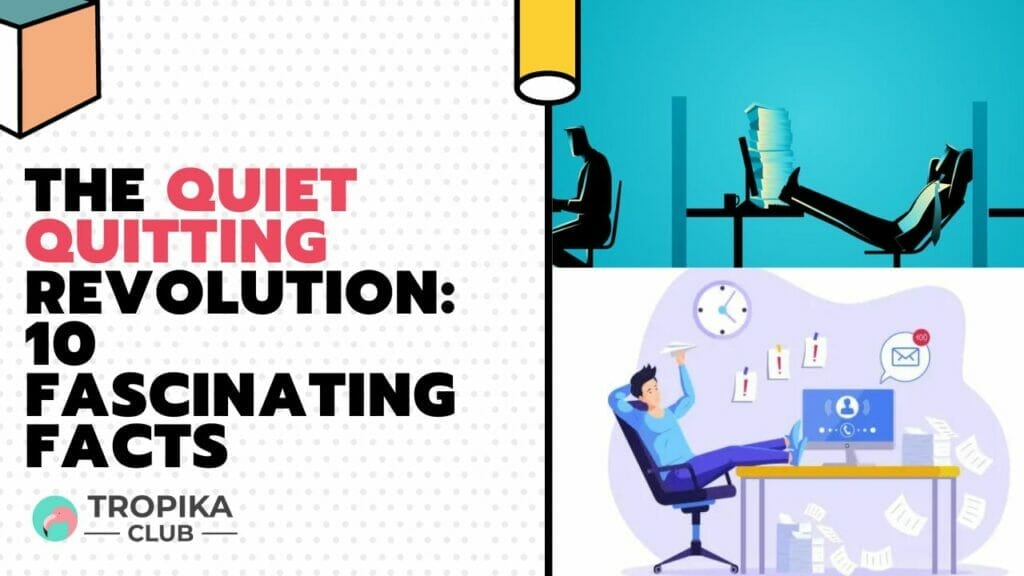The Quiet Quitting Revolution: 10 Fascinating Facts

No Time to Read? Here’s a Snappy Summary of This Article
- Pandemic Sparks Remote Work Surge: The COVID-19 pandemic accelerated the shift to remote work, changing how and where we work.
- Resignation Wave Sweeps Industries: Employees across sectors are reevaluating their careers, leading to a surge in resignations.
- Great Resignation vs. Great Reshuffle: Workers are seeking better job satisfaction and work-life balance, causing a talent reshuffling.
- Embracing Gig Economy: Many are embracing gig work and freelancing for flexibility and independence.
- Employee Well-being a Priority: Companies are focusing on mental health and employee well-being to retain talent.
- Hybrid Work Here to Stay: Hybrid work models are becoming the new norm, combining remote and in-office work for employees.
Table of Contents
- No Time to Read? Here’s a Snappy Summary of This Article
- 1. The Rise of Resignations
- 2. The Mental Health Factor
- 3. Remote Work’s Impact
- 4. The Gig Economy
- 5. Upskilling and Reskilling
- 6. The Employer’s Dilemma
- 7. Financial Independence
- 8. Social Media Influence
- 9. The Role of HR
- 10. The Future Outlook
- Meanwhile, Check Out Tropika Club’s Ecosystem of Websites
Introduction
The Quiet Quitting Revolution is not just a buzzword; it’s a seismic shift in the way we perceive employment, job satisfaction, and personal growth. As the world grapples with unprecedented challenges, Singapore is no exception. The Lion City is witnessing a transformation in its workforce, with people reevaluating their career choices and life priorities. This article delves into 10 fascinating facts about this revolution, offering a comprehensive look at why quitting is becoming a strategic move rather than a desperate act.
1. The Rise of Resignations
In recent years, Singapore has seen a surge in resignations across various sectors. This phenomenon isn’t isolated to the Lion City; it’s a global trend. However, what makes it unique in Singapore is the cultural context. Traditionally, job stability has been highly valued, but the younger generation is challenging this norm. They are prioritizing job satisfaction, work-life balance, and personal growth over long-term employment.
2. The Mental Health Factor
The pandemic has put a spotlight on mental health, and it’s one of the driving forces behind the Quiet Quitting Revolution. Employees are no longer willing to sacrifice their well-being for a paycheck. Companies in Singapore are now being scrutinized for their mental health policies, and those that don’t measure up are seeing a higher turnover rate.

3. Remote Work’s Impact
The advent of remote work has given people the freedom to reassess their work conditions. For many in Singapore, the daily commute and rigid office hours were a significant source of stress. Remote work has offered an alternative, prompting many to quit jobs that don’t provide this flexibility.

4. The Gig Economy
The gig economy is flourishing in Singapore, offering an alternative to traditional 9-to-5 jobs. This has empowered individuals to take control of their schedules and income, making quitting a full-time job less daunting. The gig economy provides a safety net, allowing people to explore different career paths without the financial instability.

5. Upskilling and Reskilling
The Quiet Quitting Revolution is also about personal growth. Many Singaporeans are quitting to upskill or reskill, investing in education to pivot into more fulfilling roles. This trend is supported by various government initiatives aimed at lifelong learning and career adaptability.

6. The Employer’s Dilemma
Employers in Singapore are facing a new challenge: retaining talent in the age of the Quiet Quitting Revolution. Traditional incentives like annual bonuses and promotions are no longer enough. Companies are now focusing on employee engagement, well-being, and career development as retention strategies.
_
Read Also:
10 Facts About the Work-Life Balance of Singaporeans: The Struggle Is Real
_
7. Financial Independence
Financial literacy and independence are becoming more prevalent, especially among the younger generation in Singapore. This has made it easier for individuals to make the bold decision to quit, knowing they have a financial cushion to fall back on.
8. Social Media Influence
Social media platforms are playing a significant role in this revolution. Stories of people quitting their jobs to pursue their passions are going viral, inspiring others in Singapore to take the leap. The narrative around quitting has shifted from failure to empowerment.
:max_bytes(150000):strip_icc()/top-ways-to-retain-your-great-employees-1919038-Final-d9266610d2df41bab7d8bc76d49d9f0d.png)
9. The Role of HR
Human Resources departments are undergoing a transformation. They are moving from administrative functions to becoming strategic partners in employee well-being. In Singapore, HR professionals are now tasked with understanding the motivations behind resignations and finding solutions to retain talent.

10. The Future Outlook
As we move forward, the Quiet Quitting Revolution is likely to evolve. What started as a response to pandemic-induced stress could become a permanent shift in how Singaporeans view employment. Companies and employees alike will need to adapt to this new landscape, where quitting is not an end but a new beginning.
Conclusion
The Quiet Quitting Revolution is more than a trend; it’s a reflection of changing societal values and priorities. As Singapore navigates this complex landscape, both employers and employees have a role to play in shaping the future of work. Understanding these 10 fascinating facts can help us better prepare for what lies ahead, turning the act of quitting from a taboo subject into an empowering choice. Quitting without notice is a growing trend that reflects the changing dynamics of the modern workplace. While some people may see it as a way to escape from unsatisfying or stressful jobs, others may view it as a sign of disrespect or unprofessionalism. Regardless of the perspective, quitting without notice has both advantages and disadvantages for the employees and the employers involved. Therefore, it is important to understand the reasons, consequences, and alternatives of this phenomenon before making such a decision.

Frequently Asked Questions (FAQ)
1. Q: What Is the Great Resignation?
A: The Great Resignation refers to the global phenomenon where a significant number of employees are voluntarily leaving their jobs to seek better opportunities or work-life balance.
2. Q: How Has Remote Work Impacted the Job Market?
A: Remote work has expanded the possibilities for job seekers, allowing them to explore opportunities worldwide without geographical constraints.
3. Q: What Are Some Key Strategies for Companies to Retain Talent?
A: Companies are focusing on improving employee well-being, offering flexible work arrangements, and providing professional development opportunities to retain their workforce.
4. Q: Is It Possible to Maintain Work-Life Balance Amid the Great Resignation?
A: Yes, by setting boundaries, prioritizing self-care, and negotiating flexible work arrangements, individuals can achieve a better work-life balance.
5. Q: What Are the Long-Term Implications of the Quiet Quitting Revolution?
A: The Quiet Quitting Revolution is reshaping the job market, with lasting effects on recruitment, company policies, and employee expectations. Staying adaptable is key.
6. Q: Why Is the Great Resignation Happening Now?
A: The Great Resignation has been influenced by the COVID-19 pandemic, which prompted many to reassess their priorities, leading to a desire for more fulfilling work.

Have an Article to Suggest?
Tropika Club is always looking for new and exciting content to feature in their magazine and they value the input of our readers. If you have any noteworthy content or articles that you believe would be a great addition to Tropika Club’s magazine, we are open to suggestions and encourage you to reach out to us via email at [email protected]. By doing so, Tropika Club values your expertise and knowledge in the matter and appreciates your willingness to help. We will review your recommendations and update our list accordingly
Meanwhile, Check Out Tropika Club’s Ecosystem of Websites

Tropika Club Magazine – Tropika Club Magazine is a Singapore-based publication that features articles on a wide range of topics with a focus on local businesses and content for the region. The magazine emphasizes supporting local businesses through its #SupportLocal initiative, which includes coverage of everything from neighborhood hawker stalls to aesthetic clinics in town. In addition to highlighting local businesses, Tropika Club Magazine also covers a variety of local content, including beauty, lifestyle, places, eats, and what’s on in Singapore and the Asia Pacific region.
Tropika Club Deals – Tropika Club Deals is a leading online deals and voucher shopping site in Singapore, offering amazing discounts on beauty, wellness, and fitness products and services. It’s the perfect platform for customers who want to discover the best deals without having to commit to a specific appointment date and time. These deals are available at major beauty stores, facial salons, hair salons, and other brands in Singapore, with no minimum spend required. Choose from guaranteed discounted deals in the categories of hairstyling, hair removal, facial & aesthetics, body slimming, brows & lashes, nails & makeup, massage & spa or fitness & wellness. Tropika Club Deals is also ideal for customers who want to buy vouchers as gifts or to use for the future. So whether you’re looking to save money on your next haircut or want to treat yourself to a relaxing massage, Tropika Club Deals has got you covered with the best voucher and coupon deals in Singapore!




